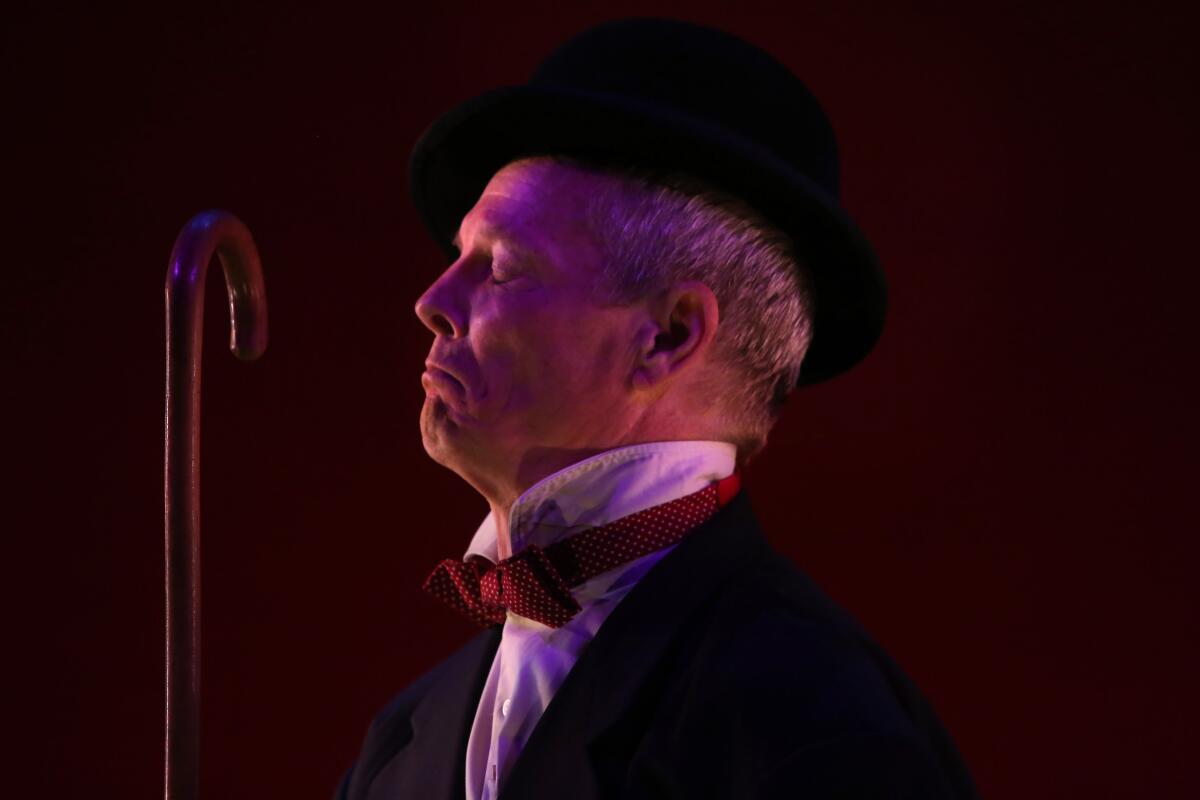Bill Irwin shares the secrets of Samuel Beckett in a master class at the Kirk Douglas

- Share via
Bill Irwin, the greatest living clown to have won a Tony Award for a dramatic performance, obviously has a spine, but it’s far more elastic than yours or mine. He can shrink or grow, fast or slow, on command. When he wobbles, it’s as though the earth beneath his feet is giving way. But fear not for his safety: He can rescue himself from total collapse with a stumbling grace that defies a few laws of physics.
Samuel Beckett, who possessed a rich memory of Dublin musical halls and circus routines, worshiped clowns. Buster Keaton (with whom he made “Film”) and Charlie Chaplin (who taught him the theatrical versatility of bowler hats) inspired Beckett in the creation of his comedy of cosmic indifference. And, of course, comedian Bert Lahr played Estragon in the American premiere of “Waiting for Godot,” which was rather ludicrously billed as the “the laugh hit of two continents.” (Dark existential comedy is admittedly harder to sell.)
Irwin, a leading American interpreter of Beckett, was tailor-made for the plays. His more or less solo performance piece “On Beckett,” which opened Wednesday at the Kirk Douglas Theatre, is a kind of theatrical TED Talk on his intractable obsession with the Irish Nobel Prize winner.
For reasons Irwin is still sorting out, the murmuring voices of Beckett’s characters have taken permanent residence inside his head. His show is an attempt to better understand what’s behind this inseverable connection. Along the way, he shares some secrets of the trade.
He appeared in two high-profile outings of “Godot.” In the 1988 production directed by Mike Nichols that starred Robin Williams and Steve Martin, he played Lucky. In the 2009 Broadway revival, he played Vladimir opposite Nathan Lane’s Estragon, with a ferocious John Goodman as slave-driving Pozzo.
Irwin performed Beckett’s prose pieces “Texts for Nothing” off-Broadway in 2000, and I can still hear actress Marian Seldes repeatedly calling out “Bravo!” during the curtain call. She wasn’t alone. Irwin is an actor’s actor, and “On Beckett” seems pitched as much to fellow thespians as Beckett superfans.
A trim and tidy fellow with a gentle manner and a shock of grizzled hair that is like a calmer version of the electrified coiffure Beckett wore in his later years, Irwin welcomes the audience with a self-effacing sweetness. He’s not a scholar, he makes clear from the outset. He hasn’t read every word that Beckett has written and doesn’t have the keys to unlock Beckett’s sometimes cryptic writing.
He doubts such keys even exist. Beckett, who miraculously balanced high literature with low comedy, is too complex for single-minded interpretations. Irwin admits his own particular lens as dramatic clown is too narrow to take in the enormousness of Beckett’s late modernism.
What Irwin has is a player’s insight into the inner theatrical workings of the writing, a wisdom earned through his own stage successes and failures. He forgoes performing an excerpt of “Endgame” after acknowledging that his one stab at the play was a flop. Curiously, he devotes quite a bit of time to nondramatic prose fiction, including “Texts for Nothing,” “Watt” and “The Unnamable,” the final novel in Beckett’s masterpiece trilogy.
“Godot” naturally figures prominently in this survey. Irwin reveals where he stands on the pronunciation of the unseen title character’s name. (After working with British director Anthony Page, he has come around to “God-o.”) Taking a look at the final scene, in which a boy (adorably played at the reviewed performance by Benjamin Taylor) appears as a messenger, Irwin demonstrates how simple permutations in the blocking can radically alter the relationship between Vladimir and a sleeping Estragon.
Fall theater season highlights for Los Angeles include a musical version of “Almost Famous,” Bill Irwin in “On Beckett,” a revival of August Wilson’s “Jitney” and a new stand-up show by comic Mike Birbiglia.
In the balance of show and tell, the latter dominates the former. If the anecdotes are more memorable than the enactments, it’s probably because the brief passages are decontextualized. Irwin uses the texts to illustrate points about the shifting nature of pronouns and the Irish cadences of dialogue that paradoxically was originally written in French. It would have been a treat to see him perform one of the shorter dramatic works from start to finish.
But a better guide to playing Beckett would be hard to find. And when it comes to the clowning elements, a master class is in session. It’s astonishing the way Irwin can transform not only his own being but the few objects surrounding him by donning a pair of baggy pants. The trick, he explains, is all in his changing silhouette.
Just as vital, however, is his genius for physical comedy. That spine of his is an instrument of hilarious virtuosity. The slapstick, however, is in service of a profound vision of stumbling humanity not succumbing to despair but getting up repeatedly despite knowing that falling is our inescapable fate.
‘On Beckett’
Where: Kirk Douglas Theatre, 9820 Washington Blvd., Culver City
When:8 p.m. Tuesdays-Fridays, 2 and 8 p.m. Saturdays, 1 and 6:30 p.m. Sundays (call for exceptions), through Oct. 27
Tickets: $30-$75 (subject to change)
Information: (213) 628-2772 or www.centertheatregroup.org
Running time: 1 hour and 30 minutes
More to Read
The biggest entertainment stories
Get our big stories about Hollywood, film, television, music, arts, culture and more right in your inbox as soon as they publish.
You may occasionally receive promotional content from the Los Angeles Times.











